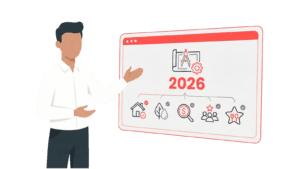Table of Contents
Updated : Mar 11, 2025
In today’s fast-paced digital era, hotel owners and managers cannot afford to overlook the immense potential of hotel digital marketing. As travelers increasingly rely on online platforms to plan their stays, mastering the art of digital marketing has become a crucial strategy for maximizing revenue and enhancing occupancy rates. By harnessing the power of targeted online campaigns, search engine optimization, and social media engagement, hotels can significantly boost their visibility and appeal to a global audience.
New facts emphasize the disruptive effect of digital marketing on hotels’ revenues and occupancy levels. According to one report by Statista, hotels that actively employ digital marketing channels saw an overall revenue growth average of 15% in the last year. Another study by McKinsey indicates that hotels that utilized strong online visibility and digital marketing campaigns recorded a 20% increase in their occupancy levels. These numbers are not mere statistics; they usher in a golden opportunity for hotel owners and managers to leverage digital marketing as a growth force.
Understanding Hotel Digital Marketing
At its core, hotel digital marketing, also known as hotel internet marketing or hotel online marketing, refers to the strategies and tactics used to promote your hotel in the digital landscape. This encompasses everything from social media campaigns to email newsletters, search engine optimization (SEO), and pay-per-click advertising.
Let’s break it down into digestible points:
1. Enhancing Online Visibility: The primary goal of hotel digital marketing is to increase your property’s visibility online. By optimizing your website for search engines and leveraging social media platforms, you can ensure that potential guests find your hotel, its amenities, room types, etc., when searching for accommodations.
2. Building a Strong Brand Presence: Through effective hotel digital marketing, you can craft a compelling brand narrative that resonates with travelers. This involves creating engaging content that highlights unique features and experiences your hotel offers, setting you apart from the competition.
3. Driving Direct Bookings: One of the main objectives of hotel digital marketing is to encourage direct bookings through your website. By reducing reliance on third-party booking platforms, you can increase profitability and foster a direct relationship with your guests.
4. Utilizing Data-Driven Strategies: Hotel digital marketing allows you to harness key metrics & data analytics to understand guest behavior and preferences. This insight enables you to tailor marketing campaigns more effectively, ensuring they reach the right audience at the right time.
5. Enhancing Guest Engagement: With personalized email campaigns and targeted social media interactions, hotel digital marketing helps maintain an ongoing dialogue with guests before, during, and after their stay. Guest engagement fosters loyalty and encourages repeat visits.
6. Adapting to Industry Trends: The digital landscape is ever-evolving, and staying updated with the latest trends is crucial for success in hotel digital marketing. Whether it’s adopting new technologies like artificial intelligence or shifting strategies based on consumer behavior changes, being adaptable ensures your hotel remains competitive.
Transform your hospitality approach today
Discover actionable strategies tailored for small hotel owners and managers creating unforgettable stays for your guests & expanding revenues for your hotel!
Start your 30-day FREE trial now!The Significance of Hotel Digital Marketing

In today’s fast-paced, tech-driven world, hotel digital marketing is more than just a buzzword—it’s a necessity.
Reaching a Wider Audience
Hotel digital marketing allows you to reach a global audience with ease. Traditional marketing methods can be limiting, but digital platforms break down geographical barriers, putting your hotel on the map for potential guests worldwide.
Consider Marriott International, a leader in hotel digital marketing. By leveraging platforms like Google Ads and social media, Marriott effectively reaches a global audience. Their campaigns are tailored to various demographics and regions, ensuring they appear in front of potential guests worldwide. This approach has broken geographical barriers, making Marriott a recognizable name across continents.
Building Brand Awareness
Establishing a strong online presence is vital for brand recognition. Through strategic hotel digital marketing efforts, such as social media campaigns and search engine optimization (SEO), you can ensure your brand stands out in the crowded hospitality landscape.
Hilton Hotels exemplifies how strategic digital marketing builds brand awareness. Through consistent social media campaigns and robust SEO strategies, Hilton ensures its brand remains prominent in the hospitality sector. Their #HiltonForTheStay campaign highlights their offerings and strengthens their presence by engaging users with relatable content and stories, making Hilton a go-to choice for travelers.
Enhancing Guest Engagement
Engaging with guests before, during, and after their stay is key to building lasting relationships. Hotel digital marketing tools like personalized email campaigns and social media interactions allow you to connect with your guests on a deeper level, enhancing their overall experience.
The Ritz-Carlton excels in guest engagement through personalized digital interactions. By sending customized emails before guests’ arrival and maintaining an active presence on platforms like Instagram, they keep the conversation going beyond check-out. This personalized engagement fosters loyalty and elevates the guest experience, encouraging repeat visits.
Driving Direct Bookings
A well-executed hotel digital marketing strategy can significantly boost direct bookings. By optimizing your website for search engines and utilizing pay-per-click advertising, you can attract more visitors to book directly through your site, reducing dependence on third-party platforms.
Accor Hotels has mastered driving direct bookings through its digital marketing strategy. By optimizing their website for search engines and utilizing targeted pay-per-click ads, Accor encourages travelers to book directly on their platform. This strategy increases direct bookings and decreases reliance on third-party booking sites, improving profit margins.
Gaining Valuable Insights
One of the most significant advantages of hotel digital marketing is access to data analytics. These insights help you understand guest preferences and behaviors, allowing you to tailor your offerings and improve your services continuously.
For instance, Hyatt Hotels is known for embracing data analytics to gain insights into guest behaviors and preferences. Their digital marketing tools collect valuable data, which informs everything from room design to promotional offers. By understanding what guests truly want, Hyatt continually refines its services, ensuring it meets and exceeds guest expectations.
How to Create Your Digital Marketing Strategy?

Creating a robust digital marketing strategy can be a game-changer for your hotel. Here’s how you can craft one that resonates with your audience and drives bookings:
1. Define Your Goals and Audience
– Start by identifying your goal—more direct bookings, increased brand awareness, or enhanced guest engagement.
– Understand your target audience. Are they business travelers, families, or luxury seekers? Tailor your strategy to meet their specific needs and preferences.
Useful Tools
– Tools like SurveyMonkey or Google Forms can help you gather insights about your potential guests and refine your target audience.
– Use Google Analytics to understand visitor demographics and behaviors, ensuring your strategy aligns with your goals.
2. Optimize Your Website
– Ensure your website is mobile-friendly and easy to navigate. Remember, a seamless user experience can significantly impact booking decisions.
– Implement SEO best practices to boost your online visibility and attract organic traffic.
Useful Tools
– For a mobile-friendly design, try using platforms like Squarespace or Wix, which offer responsive templates.
– Implementing SEO can be streamlined with tools like Yoast SEO for WordPress or Moz, helping you climb search engine rankings.
3. Leverage Social Media
– Choose the right platforms where your audience spends their time—be it Instagram for stunning visuals or LinkedIn for business travelers.
– Engage with your followers through regular posts, stories, and live sessions showcasing your hotel’s unique offerings.
Useful Tools
-Tools like Hootsuite or Buffer can manage multiple social media accounts, allowing you to schedule posts across X, TikTok, Instagram, Facebook, and LinkedIn.
– Use analytics within these platforms to tailor content that resonates with your audience.
4. Invest in Content Marketing:
– Create valuable content that addresses your guests’ pain points and interests. Think blog posts about local attractions or insider tips for a memorable stay.
– Use video content to give virtual tours of rooms or highlight special events at your hotel.
Useful Tools
– Platforms like Canva can assist in creating eye-catching visuals for blog posts or social media.
– For video content, consider using Animoto or iMovie to create professional-looking tours and event highlights.
5. Utilize Online Reviews and Reputation Management:
– Encourage satisfied guests to leave positive reviews on platforms like TripAdvisor and Google.
– Respond promptly to feedback, both positive and negative, to show potential guests that you care about their experience.
Useful Tools
– Platforms like ReviewPro can aggregate reviews from various sites, helping you manage feedback efficiently.
– Set up alerts with tools like Google Alerts to stay updated on mentions of your hotel online.
6. Implement Email Marketing:
– Build a database of past guests and interested prospects to send personalized offers and updates.
– Craft engaging newsletters that keep your hotel top-of-mind without being intrusive.
Useful Tools
– Tools such as Mailchimp or Constant Contact can help build and manage your email lists, crafting personalized newsletters that engage guests.
– Use A/B testing features to optimize subject lines and content for better open rates.
7. Explore Paid Advertising:
– Use targeted ads on Google and social media to reach potential guests actively searching for accommodation options.
– Experiment with retargeting strategies to capture the attention of visitors who didn’t book during their initial website visit.
Useful Tools
– Platforms like Google Ads and social media ad managers allow precise targeting of potential guests based on their search patterns.
– Use retargeting tools like AdRoll to re-engage visitors who have shown interest but haven’t booked yet
8. Track and Analyze Performance:
– Regularly monitor key metrics like website traffic, conversion rates, and social media engagement.
– Use analytics tools to refine your strategy and focus on high-impact areas.
Useful Tools
– Utilize comprehensive analytics tools such as Google Analytics or HubSpot to gain insights into your website’s performance metrics.
– Regularly review these insights to adjust strategies, focusing on what truly drives bookings and engagement.
By following these steps, you’ll be well on your way to developing a digital marketing strategy that attracts guests and builds long-term loyalty. Remember, in the digital age, it’s all about staying adaptable and continuously evolving with the trends.
Tips for Effective Digital Presence

1. Optimize Your Website for Mobile Users: Imagine a potential guest browsing your site on their phone. If your website isn’t mobile-friendly, you might lose them before they even see what you offer. Ensure your site is responsive, loads quickly, and provides easy navigation on all devices.
2. Leverage Social Media: Social media platforms are where your guests hang out and share experiences. Engage with them by posting captivating photos, sharing guest stories, and offering exclusive promotions. Remember, it’s not just about selling; it’s about building relationships.
3. Utilize SEO to Increase Visibility: Search Engine Optimization can sound daunting, but it’s crucial for getting your hotel noticed online. Focus on local SEO by using keywords related to your location and services. This way, travelers searching for accommodations in your area will find you first.
4. Create Valuable Content: Blog about local attractions, events, or travel tips related to your area. This not only positions your hotel as a knowledgeable resource but also improves your website’s SEO and keeps visitors engaged.
5. Encourage Online Reviews: Positive reviews can significantly influence booking decisions. Encourage satisfied guests to leave reviews on platforms like TripAdvisor or Google. Respond to reviews—both positive and negative—to show you value guest feedback.
6. Invest in Pay-Per-Click (PPC) Advertising: PPC can be a game-changer for driving targeted traffic to your website. Carefully choose keywords that reflect what potential guests are searching for and create compelling ads that highlight what makes your hotel unique.
7. Collaborate with Influencers: Partnering with travel influencers can extend your reach to potential guests who trust these individuals’ recommendations. Choose influencers whose style aligns with your brand for authentic promotion.
How Can PriceLabs Support Your Hotel Goals?
PriceLabs is a robust tool that can significantly enhance your digital marketing strategies. If you’re looking to refine your approach, PriceLabs offers a range of services tailored specifically for the hospitality industry.
Imagine having a partner that not only understands the intricacies of hotel management but also provides you with the insights needed to optimize your pricing and revenue strategies. That’s precisely what PriceLabs brings to the table. By leveraging their dynamic pricing tools, you can ensure your rates are competitive and appealing to potential guests.
But it doesn’t stop there; PriceLabs also assists in managing your online presence seamlessly. With their advanced analytics, you can track your performance across various platforms, understand guest behaviors, and adjust your strategies accordingly. This level of insight allows you to tailor marketing campaigns that truly resonate with your audience.
For those ready to dive deeper into digital marketing, PriceLabs offers integration with other platforms and tools, making it easier than ever to coordinate your efforts across channels. This ensures a cohesive and efficient strategy that maximizes reach and engagement.
So, why not take a closer look?
Way Forward
Unlike traditional marketing methods, which often rely on one-way communication through channels like print and TV, digital marketing provides a dynamic, interactive platform that fosters real-time dialogue with potential guests. This shift enhances customer engagement and allows for precise targeting and personalization, making your marketing efforts more effective and measurable.
As hotel owners and managers, embracing digital marketing doesn’t mean completely abandoning traditional methods. Instead, consider it an opportunity to integrate both approaches strategically. Traditional marketing can still play a vital role in building brand credibility and trust, especially within local markets. However, leveraging digital tools allows you to expand your reach globally, tailor messages to specific demographics, and gather valuable data insights to refine your strategies continually leading to brand awareness and revenue growth.







